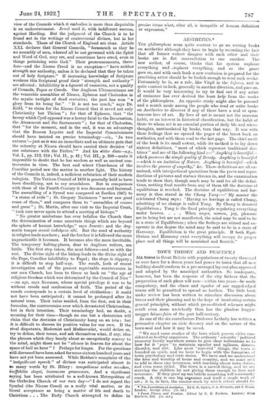AESTHETICS.*
THE philosophers seem quite content to go on writing books on aesthetics although they have to begin by recording the fact
that all former writers disagree with each other and their books are in fiat contradiction to one another. The new author, of course, thinks that his system explains everything and .replaces everything, and so the game goes on, and with each book a new confusion is prepared for the practising artist should he be foolish enough to read such works. Fortunately he is, as a rule, like Virgil in the Inferno, and is quite content to look, generally in another direction, and pass on. It would be very interesting to try to find out if any artist of eminence has ever derived the least help from the works of the philosophers. An opposite study might also be pursued and a search made among the people who read or write books on Aesthetics to discover if any of these have a real or spon- taneous love of art. By love of art is meant not the museum habit, or an interest in historical classification, but the habit of those to whom art is an essential portion of daily life and whose thoughts, unstimulated by books, turn that way. It was with those feelings that we opened the pages of the latest book on aesthetics, and with them read to the last page. The chief merit of the book is its small extent, while its method is to lay down sixteen definitions, " most of which represent traditional doc- trines " and are of the following kind :—" Anything is beautiful— which possesses the simple quality of Beauty. Anything is beautiful —which is an imitation of Nature. Anything is beautiful—which involves the process of empathy," &c. These definitions are all ex- amined, with interjectional quotations from the poets and repro- ductions of pictures and statues thrown in, and the examination tends to show that, though much may be said for all the defini- tions, nothing final results from any of them till the doctrine of equilibrium is reached. The doctrine of equilibrium and har- mony is thus stated in the Chung Yung:—" My master the celebrated Chang says : ' Haring no leavings is called Chung, admitting of no change is called Yung. By Chung is denoted Equilibrium ; Yung is the fixed principle regulating everything under heaven. . . . When anger, sorrow, joy, pleasure are in being but are not manifested, the mind may be said to bo in a state of Equilibrium ; when the feelings are stirred and co- operate in due degree the mind may be said to be in a state of Harmony. Equilibrium is the great principle. If both Equi- librium and Harmony exist everything will occupy its proper place and all things will be nourished and flourish."


































 Previous page
Previous page